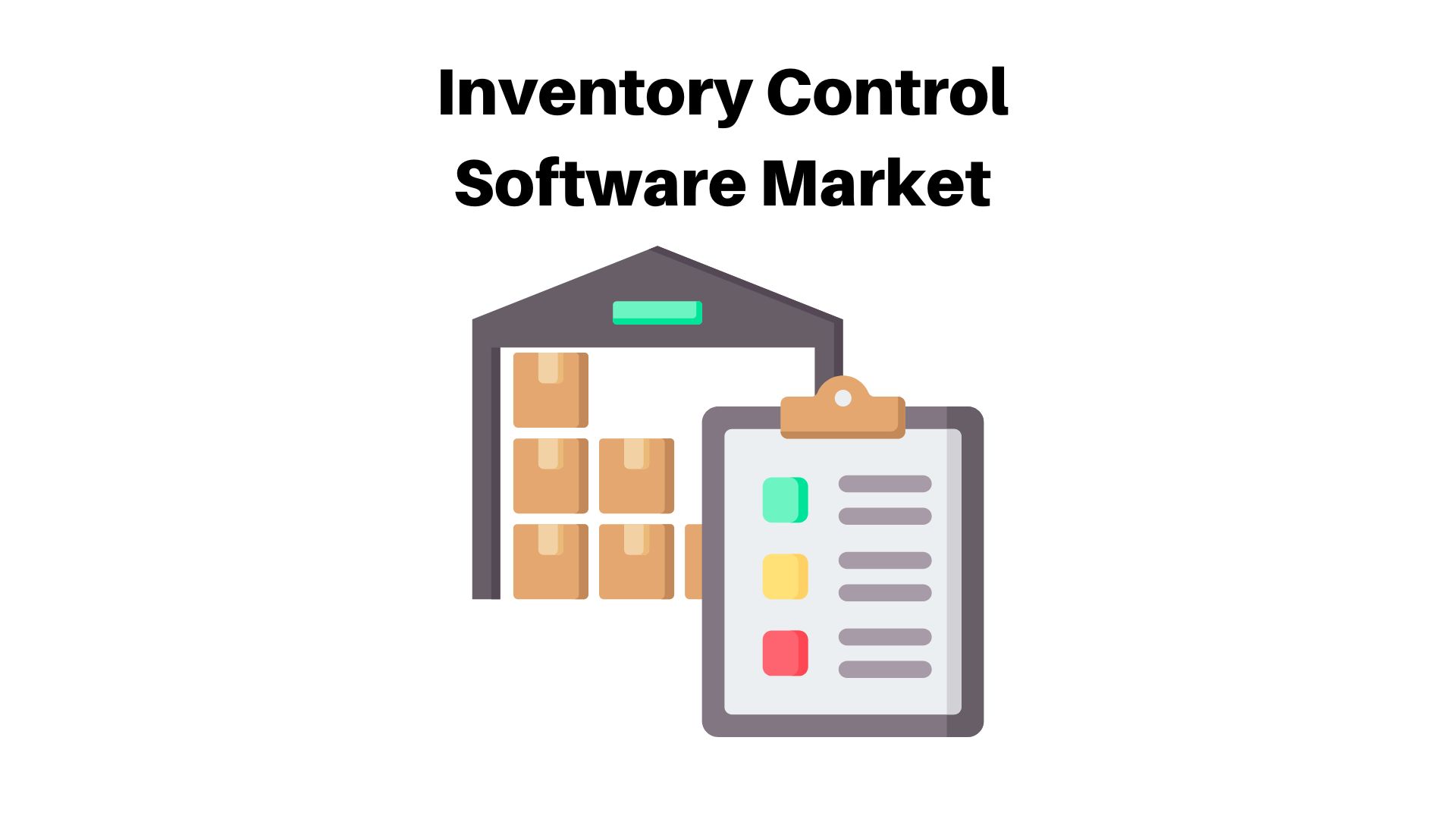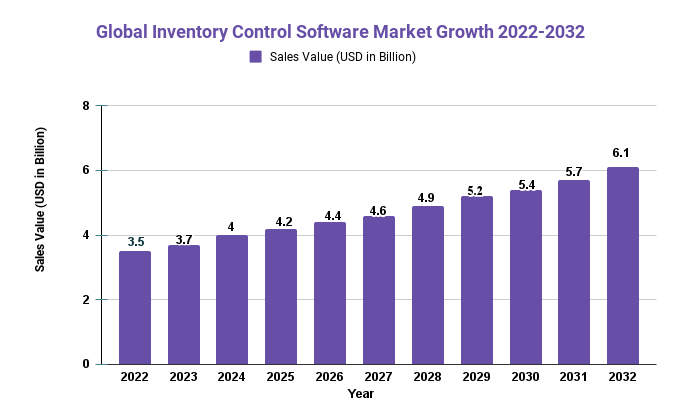Inventory Control Software Market Size Will Reach USD 6.1 Bn by 2032| at a CAGR 5.5%

Page Contents
Market Overview
Published Via 11Press: The Inventory Control Software Market was experiencing rapid growth, which was expected to continue in the years ahead. Additionally, the COVID-19 pandemic which started in 2020 has had an effect on this market as businesses have had to adjust to altered consumer habits and supply chain disruptions.
Inventory Control Software Market size is expected to surge from USD 3.5 billion in 2022 to USD 6.1 billion by 2032, rising at an annual compound growth rate (CAGR) of 5.5% during the forecast period. Unfortunately, this market remains highly fragmented with many vendors providing inventory control software solutions.
The inventory control software market is highly competitive and fragmented, with numerous vendors offering various solutions. Some of the leading players include Oracle Corporation, SAP SE, IBM Corporation, Microsoft Corporation, and Infor Inc.
There is a trend toward the integration of inventory control software with other business systems, such as point-of-sale (POS) systems and enterprise resource planning (ERP) programs. This integration gives businesses a more comprehensive view of their operations and enhances decision-making processes.

Drivers, trends, and challenges have an impact on market dynamics, which can impact businesses. Request for PDF sample report
Key Takeaways
- The inventory control software market is experiencing remarkable growth and is projected to remain so in the coming years due to factors such as an increasing need for real-time inventory management and the growth of e-commerce.
- The inventory control software market is highly competitive and fragmented, with numerous vendors offering various solutions.
- Integration between other business systems such as point-of-sale (POS) and enterprise resource planning (ERP) systems is becoming more common, providing businesses with a comprehensive overview of their operations.
- The adoption of advanced technologies such as artificial intelligence and machine learning are expected to have a major impact on the market over the coming years.
Regional Snapshot
- North America is the leading market for inventory control software, thanks to a few major players and the rapid adoption of new technologies.
- Asia Pacific is projected to be the fastest-growing market for inventory control software, due to the rapid expansion of e-commerce in this region.
- Europe also plays an important role in this space with a major focus on supply chain optimization and efficiency improvements.
- Latin America and the Middle East and Africa (MEA) are expected to experience moderate growth in the inventory control software market, due to increasing awareness of its advantages among businesses in these regions.
Drivers
- Growing Need for Real-Time Inventory Management: As businesses strive to optimize their inventory management processes and reduce costs, real-time inventory management has become more crucial. Inventory control software offers real-time data that enables companies to make informed decisions about inventory levels, reordering, and stock rotation.
- Rise of E-commerce: As the popularity of e-commerce grows, businesses must manage larger and more intricate inventory systems. Inventory control software offers the necessary tools for inventory management across multiple channels and locations.
- Adoption of cloud-based solutions: Cloud-based inventory control software has made it simpler for businesses to manage inventory across multiple locations and access real-time data from any location, leading to an increase in demand for such software solutions.
- Integration with Other Business Systems: Integrating inventory control software with other enterprise applications such as point of sale (POS) or ERP gives businesses a comprehensive overview of their operations and enhances decision-making processes.
Restraints
- High implementation costs: Implementing inventory control software can be expensive, especially for small and medium-sized businesses. This may pose a barrier to adoption for those with limited funds.
- Resistant to Change: Some businesses may be unwilling to adapt and may opt for manual inventory control methods instead. This could limit the growth of the inventory management software market.
- Data Security Concerns: Inventory control software systems store sensitive information about a business's inventory and operations, raising concerns about data security and potential breaches.
- Lack of Skilled Personnel: Implementing inventory control software necessitates personnel with the required technical abilities. Unfortunately, in certain regions, there may be a shortage of experienced personnel, which could hinder market expansion.
Opportunities
- Adoption of New Technologies: Businesses can benefit from the implementation of advanced technologies like artificial intelligence, machine learning, and the Internet of Things (IoT) into inventory control software by improving their inventory management processes and cutting costs.
- Emerging Markets: With the rapid expansion of e-commerce and an increase in the use of inventory control software in emerging markets, vendors can gain an edge to expand their customer base.
- Customization: Inventory control software solutions that are customizable to businesses' individual requirements offer vendors a chance to stand out in an increasingly crowded market.
- Service-based Models: Service-based models, such as software-as-a-service (SaaS), offer vendors the potential to generate recurring revenues and boost customer loyalty.
Challenges
- Competition: The inventory control software market is highly competitive, with many vendors providing similar solutions. This makes it difficult for vendors to stand out and attract new customers.
- Data Quality Issues: Inventory control software relies on accurate and timely data to provide useful insights. Unfortunately, poor data quality can result in inaccurate forecasts and ineffective inventory management.
- Integration Challenges: Integrating inventory control software with other business systems can present unique challenges, particularly for businesses with complex IT infrastructures.
Recent Developments
- In 2021, Oracle unveiled its Inventory Optimization Cloud Service which utilizes machine learning algorithms for real-time inventory optimization.
- In 2021, Zoho Inventory introduced “Multi-Location Inventory Control,” allowing businesses to manage inventory across multiple locations in real-time.
- In 2020, Fishbowl Inventory released its Inventory Control version 2021.1 with new capabilities such as barcode scanning, custom reports, and enhanced integrations with other business systems.
- In 2019, Microsoft unveiled its Dynamics 365 Supply Chain Management solution, featuring inventory control features like demand forecasting and planning.
Key Market Segments
Type
- Cloud Based Inventory Control Software
- On-Premises Inventory Control Software
- Web-based Inventory Control Software
Application
- Factory
- Wholesale and Retail Company
Key Market Players
- Fishbowl Inventory
- Wasp Barcode Technologies
- Dapulse
- Agiliron Inventory Management
- Cairnstack Software
- ADI Business Solutions
- Lead Commerce
- Infoplus
- Zoho Inventory
- NetSuite
- Need
- HAL Systems
- RedBeam
- Blue Link
- Clearly Inventory
- Infotech Systems
- Ecomdash
- Axon Software
- iMagic Inventory
- SAP
Report Scope
| Report Attribute | Details |
| The market size value in 2022 | USD 3.5 Bn |
| Revenue forecast by 2032 | USD 6.1 Bn |
| Growth Rate | CAGR Of 5.5% |
| Regions Covered | North America, Europe, Asia Pacific, Latin America, and Middle East & Africa, and Rest of the World |
| Historical Years | 2017-2022 |
| Base Year | 2022 |
| Estimated Year | 2023 |
| Short-Term Projection Year | 2028 |
| Long-Term Projected Year | 2032 |
Frequently Asked Questions
Q: What is inventory control software?
A: Inventory control software is a type of software that helps businesses manage their inventory levels, track stock movements, and optimize their inventory management processes.
Q: What are the benefits of using inventory control software?
A: The benefits of using inventory control software include real-time inventory tracking, improved accuracy and efficiency, reduced inventory carrying costs, and improved decision-making processes.
Q: What types of businesses can benefit from inventory control software?
A: Inventory control software can benefit businesses of all sizes and across all industries. However, it is particularly useful for businesses with large and complex inventory systems or those with multiple locations.
Q: What features should I look for in inventory control software?
A: Features to look for in inventory control software include real-time inventory tracking, demand forecasting, barcode scanning, integration with other business systems, and customizable reporting and analytics.
Q: Is inventory control software easy to use?
A: The ease of use of inventory control software varies depending on the solution. Some solutions are designed to be user-friendly and intuitive, while others may require more technical knowledge to use effectively.
The team behind market.us, marketresearch.biz, market.biz and more. Our purpose is to keep our customers ahead of the game with regard to the markets. They may fluctuate up or down, but we will help you to stay ahead of the curve in these market fluctuations. Our consistent growth and ability to deliver in-depth analyses and market insight has engaged genuine market players. They have faith in us to offer the data and information they require to make balanced and decisive marketing decisions.